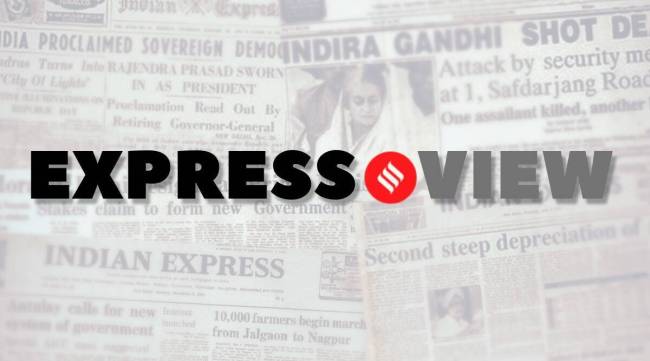Opinion Express View: Dissent over its Karnataka candidates will test BJP’s managerial skills
The open rebellion over seat distribution points to the absence of assertive state leadership. The party's attempts to expand its footprint by encouraging defections from rival parties have contributed to the mess.
 The dissension will test the party leadership's managerial skills as the campaign picks up ahead of the May 10 vote.
The dissension will test the party leadership's managerial skills as the campaign picks up ahead of the May 10 vote. The BJP leadership has a task in hand as leaders who have been refused tickets threaten to rock the party’s boat in the run-up to polls in Karnataka. At least 16 sitting MLAs have been denied seats, as the party released its second list of 23 candidates on Wednesday. So far, it has released names for 212 out of a total of 224 constituencies. Former Chief Minister Jagadish Shettar, who has not been given a seat yet, expressed his unhappiness openly. Former Deputy CM Laxman Savadi quit the party after being denied a ticket. The dissension will test the party leadership’s managerial skills as the campaign picks up ahead of the May 10 vote.
The Karnataka BJP has been in a state for churn ever since the central leadership decided to look beyond B S Yediyurappa. BSY was the unquestioned leader of the party for decades and credited with building the BJP up from the grass roots. He was also the party’s bridge to the powerful Lingayat community that has backed both BSY and the BJP. His rebellion a decade ago cost the BJP dearly and thereafter, the party has been sensitive to his demands. However, the BJP has also been careful not to let BSY, now plagued by charges of nepotism and corruption, have complete total control over the organisation. Multiple power centres and factions now compete for dominance. The open rebellion over seat distribution points to the absence of an assertive state leadership. The party’s attempts to expand its footprint in the state by encouraging defections from rival parties has also contributed to the mess. For instance, it has felt compelled to hand out tickets to leaders who crossed over from the Congress and JD(S) to prop up a BSY-led government in 2019 at the expense of party loyalists. The party’s social engineering strategy now seems to eye the Vokkaligas, a dominant community in southern Karnataka, which has in recent years backed the JD(S). The party has fielded more Lingayats, its core support group, and more Vokkaligas as compared to the 2018 assembly election. The Basavaraj Bommai government’s recent manoeuvres on quota politics — it ended a four per cent quota for Muslims and distributed it to Vokkaligas and Lingayats — suggests that the party is hopeful of winning the trust of both communities.
The post-BSY phase has allowed the BJP’s central leadership to force its say on the local unit. The choice of Bommai, an import from the Janata and seen as a lightweight in the party, as CM, suggests an intent to control the state unit from the centre. It’s likely that the BJP may not want another regional strongman to emerge in its only stronghold in the country’s south.




